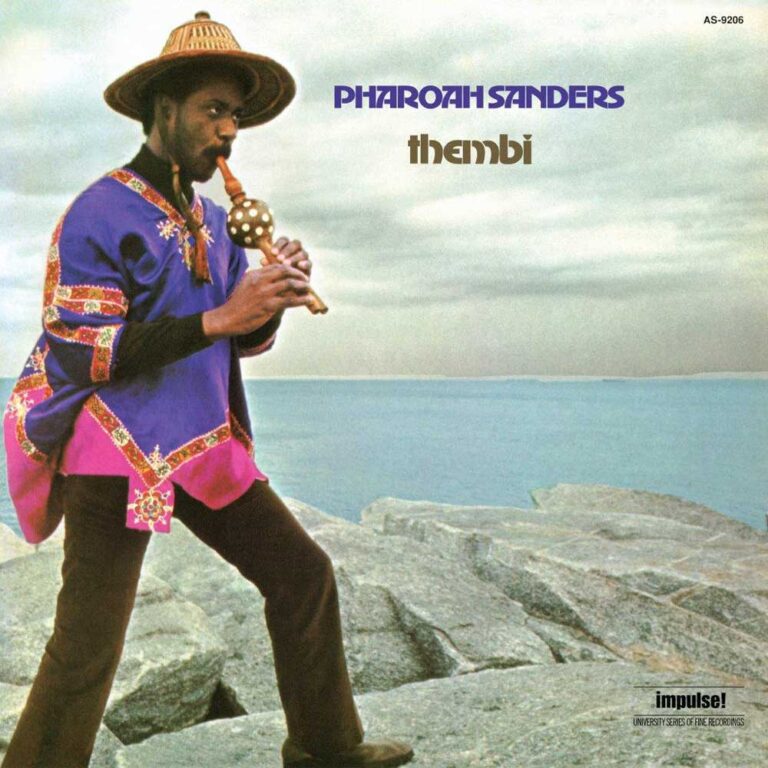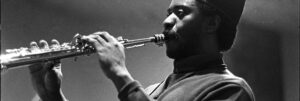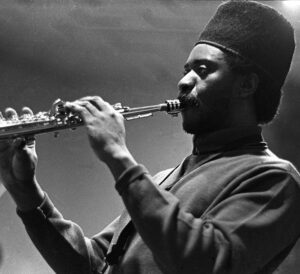Pharoah Sanders’ fifth release for the label, “Thembi” sits halfway through his Impulse! discography but, more than that, it seems to neatly encapsulate much of what had come before, while pointing ahead to future excursions. While many of Sanders’ previous albums had been built around long, extended vamps – such as the 33-minute “The Creator Has A Master Plan” from 1969’s “Karma” – with “Thembi,” for the first time, he presented a suite of much shorter and more concise compositions. With its six tracks clocking in at between five and nine minutes long, “Thembi” gives Sanders the opportunity to explore a range of moods.

PHAROAH SANDERS Thembi LP (Verve By Request Series)
Available to purchase from our US store.The album is also notable for being the last of Sanders’ to feature pianist Lonnie Liston Smith, who had appeared on the three dates immediately preceding it. Moreover, it marks the very first time Smith played the Fender Rhodes electric piano, providing the basis for the album’s stand-out track. The story goes that, while waiting for the rest of the band to set up, Smith started tinkering around on a Fender Rhodes in the corner of the studio and, there and then, composed “Astral Traveling,” which kicks off side one.
Beginning with a sudden, blissful Rhodes chord, it’s instantly bathed in a warm, cosmic glow, borne along by Cecil McBee’s supremely deep double-bass hook. Sanders enters with a sweetly wistful soprano sax figure, but it’s Smith’s Rhodes that steals the show, sending out psychedelic ripples, and establishing a mellow, otherworldly sound that Smith would go on to develop with his own band, the Cosmic Echoes, on a string of albums throughout the 70s and into the 80s.
Smith’s presence is also felt on the title track – co-composed with Sanders – on which McBee’s killer riff sets up an upbeat groove as Sanders’ pretty soprano entwines with Michael White’s joyously soaring violin, and Smith takes a lilting, bluesy acoustic piano solo for the ages. It’s the kind of unabashedly happy sound Sanders would later explore in more depth on albums like 1978’s “Love Will Find A Way.”
But “Thembi” also touches down in more avant-garde territory. “Love” is an extended double bass solo, with McBee dealing out thick, plucked clusters and sonorous arco laments. Most arresting, though, is “Red, Black and Green,” which finds Sanders looking back to the scorched intensity of his work in John Coltrane’s final band. Beginning with an abrupt blast of overdubbed, multi-phonic horn shrieks and cavernous, pounded piano, yearning tenor themes soon arise from the tumult, supported by lurching violin flickers, as a sense of hard-won peace emerges from the turmoil.
The album’s concluding medley of “Morning Prayer” and “Bailophone Dance” proposes the kind of outer-national, fourth world aesthetic that Sanders would fully commit to with his next album, “Black Unity,” released later the same year. A strummed Japanese koto unleashes harp-like cascades before African hand drums lay down a gentle groove embellished with fluttering flutes and Smith’s agile, McCoy Tyner-esque piano. In the second half, the percussion switches up a gear, goading Sanders to wrench up more overblown tenor honks before a flurry of multiple flutes and burbling balafon suggest something akin to Don Cherry’s contemporaneous world-jazz experiments.
Both accessible and challenging in equal measure, “Thembi” covers a wide range of conceptual touchpoints, and remains one of Pharoah Sanders’ most compelling and rewarding statements.
Read on…“Karma” Pharoah Sanders’ Spiritual Jazz Classic
Daniel Spicer is a Brighton-based writer, broadcaster and poet with bylines in The Wire, Jazzwise, Songlines and The Quietus. He’s the author of a book on Turkish psychedelic music and an anthology of articles from the Jazzwise archives.
Header image: Pharoah Sanders. Photo: Michael Ochs Archives/Getty Images.


